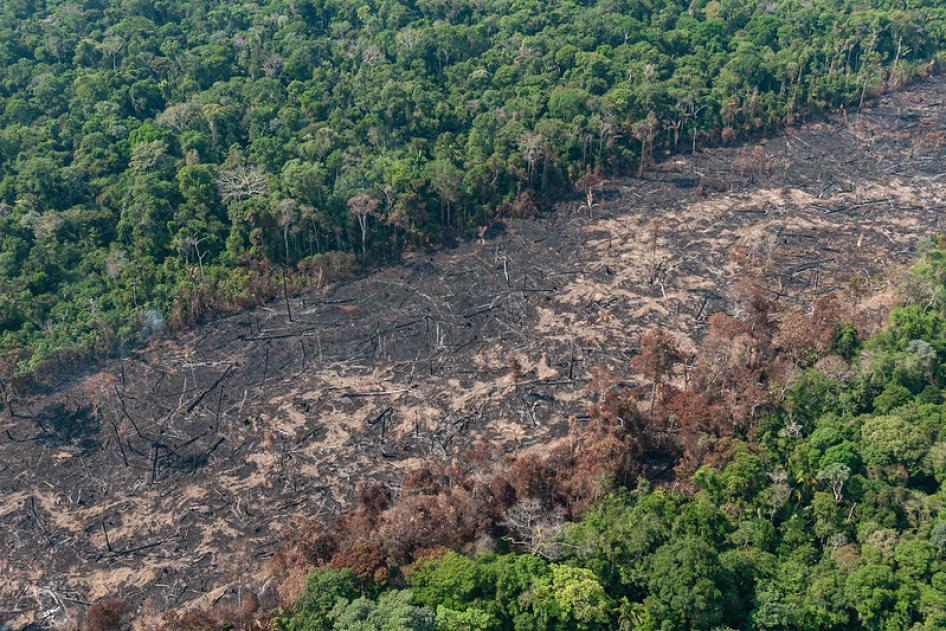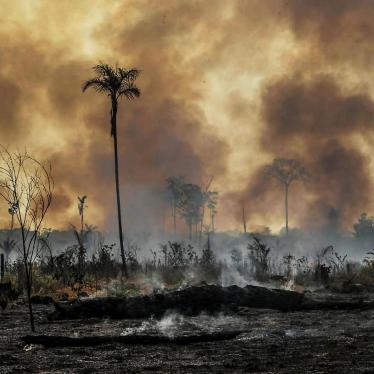At the Mercosur summit held virtually last week, President Jair Bolsonaro reiterated his administration’s desire to finalize a trade deal with the European Union. Yet a growing number of European leaders have expressed doubts about the deal given how his anti-environmental policies have sabotaged Brazil’s capacity to protect the Amazon.
We have been meeting with senior officials throughout Europe and this week sent them a public letter with a simple message: their doubts are fully justified, but it’s time they make clear what steps Brazil could take to assuage them.
The trade deal, agreed to in principle last June, includes commitments to fight deforestation and uphold the Paris climate agreement. Yet Bolsonaro has shown no intention of honoring either. On the contrary, he’s lashed out at European leaders who suggest he should protect the Amazon. Speaking at the UN General Assembly last year, he denounced their “colonialist spirit,” claiming they had “questioned that which is most sacred to us: our sovereignty!”
Concerns about the Amazon’s demise are not, in fact, a European imposition. Brazil was once a global leader in forest conservation. Between 2004 and 2012, a concerted effort by the government and Brazilians of many backgrounds—including Indigenous communities, environmental groups, and private enterprise—produced an 80 percent decrease in deforestation. But after 2012, budget cuts and policy missteps weakened Brazil’s environmental enforcement agencies, and deforestation rebounded.
This rebound has been driven largely by violent criminal networks from whom the Bolsonaro government has abjectly failed to protect Brazilians, as is its duty. A 2019 Human Rights Watch report documented how these local mafias threaten, attack, and kill environmental enforcement agents, members of Indigenous communities, and other rainforest residents who get in their way. The killers are rarely brought to justice.
The real conflict over the Amazon, in other words, isn’t between Brazilian sovereignty and European environmentalism. It’s between criminal mafias razing the rainforest and the law-abiding Brazilians who are trying to stop them.
Bolsonaro has effectively sided with the mafias. He has sabotaged Brazil’s already weakened environmental agencies and sought to sideline its environmental groups. It’s no surprise that deforestation rose by more than 80 percent last year—according to data based on real-time alerts by Brazil's Space Research Agency—and continues to increase this year. Nor is it a surprise that threats against forest defenders have also increased.
The European Union has ample reason to support Brazil’s forest defenders. Scientists say that unchecked deforestation is speeding the Amazon toward an irreversible “tipping point,” where it will stop serving as a “carbon sink” and release massive amounts of stored carbon. The result will compound the climate crisis that threatens Europeans and Brazilians alike. Moreover, the “Green Deal” adopted by the EU earlier this year commits it to ensuring that its trade policy reduces deforestation in its supply chains and contributes to global efforts to curb climate change.
The environmental provisions of the trade deal were negotiated with these concerns in mind. What sense would it make for the EU to ratify the agreement when Bolsonaro is actively dismantling Brazil’s capacity to comply with these provisions and actually hastening that “tipping point” where compliance could become impossible?
Instead, the EU should send a clear and categorical message to Bolsonaro that ratification cannot be considered until Brazil shows it’s ready to comply with its environmental commitments. To assess this readiness, the EU should establish clear benchmarks, based on concrete results, not plans or proposals.
These benchmarks should address the interrelated problems at the heart of the crisis: violence and deforestation. One such benchmark should be showing substantial progress in ending impunity for violence against forest defenders, as measured by the number of these cases investigated, prosecuted and brought to trial. A second should be a reduction in deforestation rates that is sufficient to put the country back on track to meet its own targets under the Paris Agreement.
Insisting that Brazil needs to enforce its own laws in this way is not a “colonialist” imposition, but rather a way to support Brazilians defending their own laws. Indeed, it’s a precaution that Brazil’s national association of Indigenous peoples (APIB) and its largest coalition of environmental groups (Observatório do Clima) have urged Europe to take. And it would be fully consistent with the European Green Deal’s commitment to a climate-safe trade policy.
It would also be consistent with political reality. Opposition to the deal is growing in Europe, much of it citing Bolsonaro’s environmental record. If Brazil can’t turn around its Amazon policy soon, ratification may well prove to be impossible.







